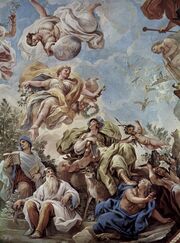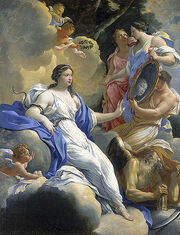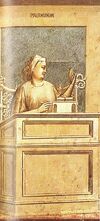(New page: {{PersonPsy]] thumb|right|Prudence, by [[Luca Giordano]] thumb|left|Allegory of Prudence, by [[Simon Vouet]] Classically, ''...) |
No edit summary |
||
| Line 1: | Line 1: | ||
| − | {{PersonPsy |
+ | {{PersonPsy}} |
[[Image:Luca Giordano 014.jpg|thumb|right|Prudence, by [[Luca Giordano]]]] |
[[Image:Luca Giordano 014.jpg|thumb|right|Prudence, by [[Luca Giordano]]]] |
||
Latest revision as of 21:37, 27 April 2007
Assessment |
Biopsychology |
Comparative |
Cognitive |
Developmental |
Language |
Individual differences |
Personality |
Philosophy |
Social |
Methods |
Statistics |
Clinical |
Educational |
Industrial |
Professional items |
World psychology |
Personality: Self concept · Personality testing · Theories · Mind-body problem

Prudence, by Luca Giordano

Allegory of Prudence, by Simon Vouet
Classically, prudence is considered to be a virtue, and indeed, one of the Cardinal Virtues. The word comes from Old French prudence (13th century), from Latin prudentia "foresight, sagacity," contraction of providentia "foresight". It is often associated with Wisdom, Insight, and Knowledge. In this case, the virtue is the ability to judge between virtuous and vicious actions, not only in a general sense, but with regard to appropriate actions at a given time and place. Although prudence itself does not perform any actions, and is concerned solely with knowledge, all virtues had to be regulated by it. Distinguishing when acts are courageous, as opposed to reckless or cowardly, for instance, was an act of prudence. This is why it is classified as a "cardinal" which is to say "pivotal" virtue.
Although prudence would be applied to any such judgment, the more difficult tasks, which distinguish a person as prudent, are those in which various goods have to be weighed against each other, as when a person is determining what would be best to give charitable donations, or how to punish a child so as to prevent repeating an offense.
Conventionally, prudence is the exercise of sound judgment in practical affairs.
In modern English, however, the word has become increasingly synonymous with cautiousness. In this sense, prudence names a reluctance to take risks, which remains a virtue with respect to unnecessary risks, but when unreasonably extended (i.e. over-cautiousness), can become the vice of cowardice.
In the Nichomachean Ethics, Aristotle gives a lengthy account of the virtue phronesis (Greek: ϕρονησιϛ), which has traditionally been translated as "prudence", although this has become increasingly problematic as the word has fallen out of common usage. More recently ϕρονησιϛ has been translated by such terms as "practical wisdom" or "practical judgment."
Prudential judgments
In ethics, a "prudential judgement" is one where the circumstances must be weighed to determine the correct action. Generally, it applies to situations where two people could weigh the circumstances differently and ethically come to different conclusions.
For instance, in Just War theory, the government of a nation must weigh whether the harms they suffer are more than the harms that would be produced by their going to war against another nation that is harming them; the decision whether to go to war is therefore a prudential judgment. Meaning being rational and not impetuos.
For instance, a patient who has a terminal illness with no conventional treatment may hear of an experimental treatment. To decide whether to take it would require weighing on one hand, the cost, time, possible lack of benefit, and possible pain, disability, and hastened death, and on the other hand, the possible benefit and the benefit to others of what could be learned from his case.
Rules of Prudence

Prudence, by Giotto di Bondone
Rules of Prudence are designed to serve self interest. "Do not drink the cleaning solution" would be a rule of prudence. This rule would be considered a moral rule because it is morally wrong to drink cleaning solution; it does serve your best interest not to.
External links
| This page uses Creative Commons Licensed content from Wikipedia (view authors). |